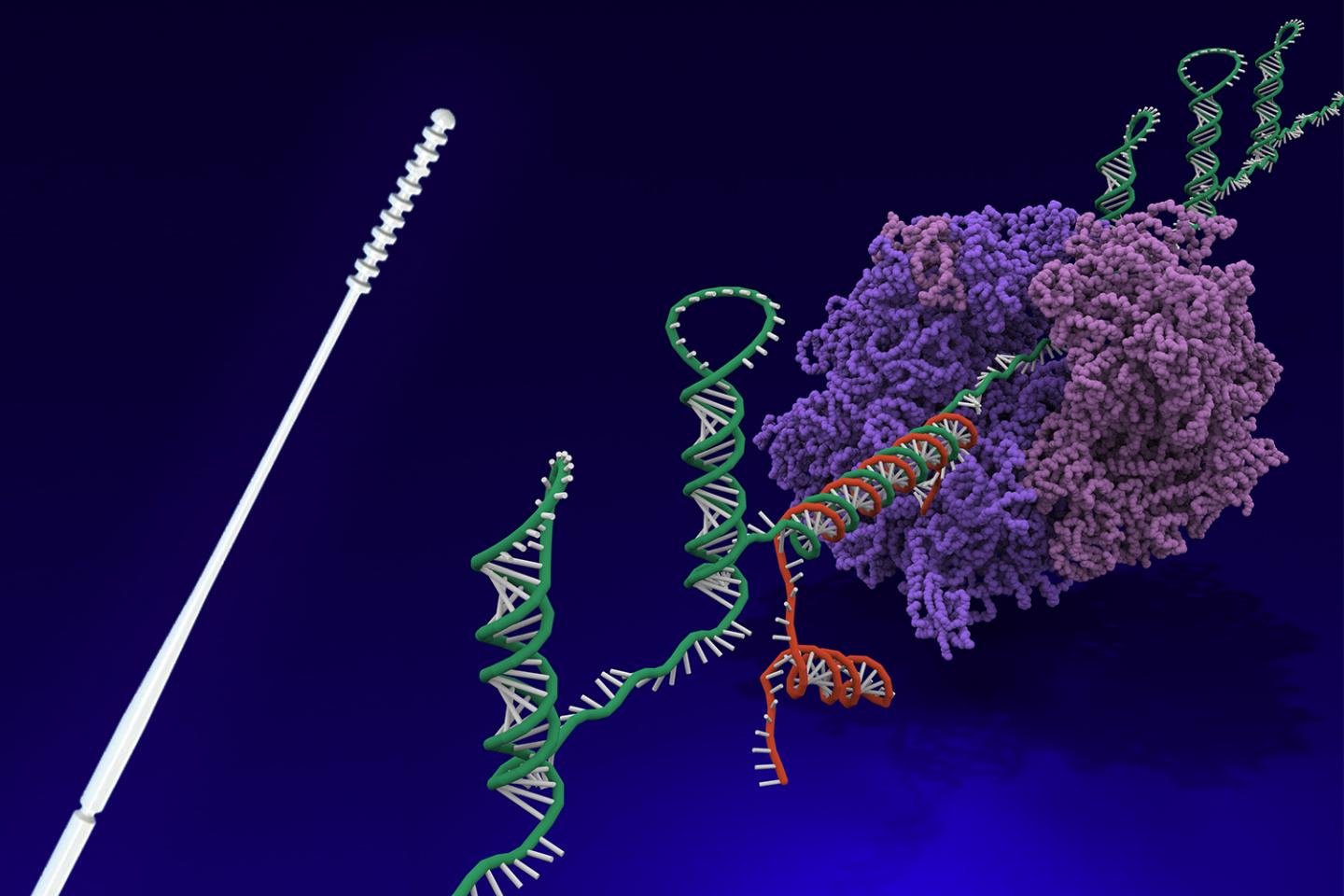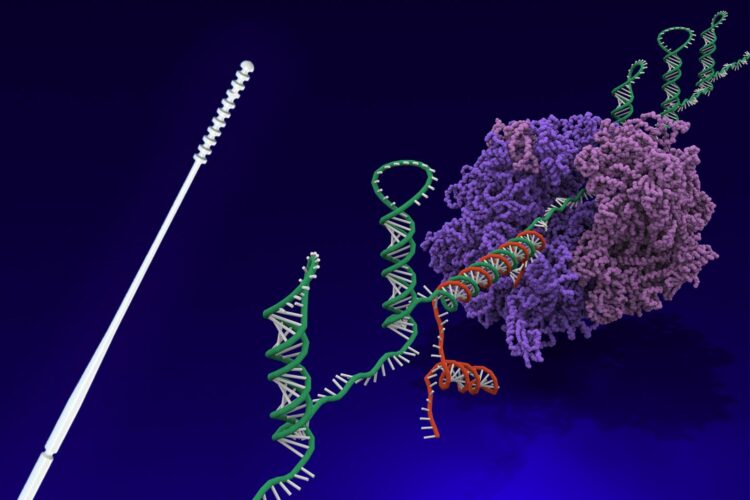The two technologies function at different points of the diagnostic process and could help detect the SARS-CoV-2 virus in the anticipated second wave of the pandemic

Credit: Credit: Wyss Institute at Harvard University
(BOSTON) — The Wyss Institute for Biologically Inspired Engineering at Harvard University announced today that its nasopharyngeal swab and toehold switch technologies have been licensed to Alabama-based Agile Biodetection, which will use them to develop solutions for unmet diagnostic needs in the detection of the SARS-CoV-2 virus in environmental or clinical settings. The licensing agreement was coordinated by Harvard’s Office of Technology Development (OTD) in accordance with the University’s commitment to the COVID-19 Technology Access Framework.
The Wyss Institute’s nasopharyngeal (nasal) swabs were developed in a multi-institutional and multi-disciplinary group effort led by Wyss Institute Senior Staff Engineer Richard Novak, Ph.D., and the Wyss’ Founding Director Donald Ingber, M.D., Ph.D., as part of the Institute’s collective response to the COVID-19 pandemic. Motivated by the serious shortage of swab devices for the collection of nasopharyngeal samples early in the pandemic, the researchers created a simple and effective device with advantages over other designs. The Wyss swab device is fully injection-molded from a single material, and as such, can be mass manufactured in a one-step process that is faster, less expensive, and routinely used by a broad range of experienced medical device manufacturers worldwide. Conventional nasal swabs that are commonly used in infectious disease diagnostic medicine were designed 50 years ago, and are manufactured in two parts from different materials that then need to be assembled, sterilized and packaged in a multi-step process, which requires considerable time and expense. In successful tests performed by academic collaborators and teaching hospitals, the unique nasal swab design was demonstrated to effectively collect SARS-CoV-2 genetic RNA material from the nostrils of patients and to be more comfortable than existing commercial products.
Toehold switches could come into play at the other end of the COVID-19 diagnostic process. Pioneered in the groups of Wyss Core Faculty members James Collins, Ph.D., and Peng Yin, Ph.D., they are synthetic nucleic acid-based devices that function as sensors for external stimuli (“inputs”), like RNA molecules derived from pathogenic viruses. When integrated into synthetic gene circuits, Toehold Switches can be designed to turn on a gene of interest, which can be a reporter signaling the presence of the environmental stimulus. In their OFF state, these nanotechnological devices form a hairpin-like structure that specifically associates with and actively blocks the expression of a (reporter) target gene. Once an “input” RNA binds to their “toehold” region, the hairpin structure opens up and adopts an ON state to allow the protein-synthesizing machinery access to the target gene, which results in the synthesis of the actual signaling molecule.
In a series of proof-of-concept studies, the Collins and Yin teams have demonstrated toehold switches to function in living cells as computational devices that can assess and report complex combinations of environmental stimuli. They also have utilized them as key components of paper-based synthetic gene circuits that can be applied as diagnostics to sense and indicate different pathogens, including Ebola and Zika viruses. The versatile capabilities of Toehold Switches offer an opportunity for inexpensively and effectively surveilling the presence of pathogens with high sensitivity and specificity in different environmental settings, including working environments during the reopening phase of the pandemic.
Paving the way to real-world diagnostic solutions
Agile Biodetection is approaching the pandemic from an alternate viewpoint. Instead of testing patients for the virus, they’re focusing on detecting SARS-CoV-2 in the environment, including on surfaces and touchpoints within high-traffic areas. They’re applying a high-throughput cloud-based system to dissiminate the results of testing, making it faster and providing a leading indicator of the risk of infection.
“We believe that 3-pronged testing… of individuals, surfaces, and the environment, will be necessary to provide students, consumers and employees confidence to start the path back to normalcy,” said Kanti Sunkavalli, M.D., M.B.A., the CEO of Agile Biodetection.
Harvard co-led the creation of the COVID-19 Technology Access Framework, now endorsed by 23 other research institutions, to incentivize the rapid utilization of available technologies that can facilitate the diagnosis, treatment, and prevention of COVID-19 infection in the fight against the pandemic. Accordingly, the term-limited license agreement crafted by Harvard OTD grants Agile non-exclusive, royalty-free access to the Wyss nasal swab and Toehold Switch technologies for use in new SARS-CoV-2 detection approaches during the pandemic.
“This licensing agreement speaks to our Institute’s ability to rapidly pivot and refocus our undivided attention on important and difficult problems in real-time as they arise, as we did with COVID-19. We are fully committed to help soften the blow of the pandemic in any way we can, and to help get bring normalcy into our lives again,” said Ingber, who is also the Judah Folkman Professor of Vascular Biology at Harvard Medical School and Boston Children’s Hospital, and Professor of Bioengineering at SEAS.
###
PRESS CONTACTS
Wyss Institute for Biologically Inspired Engineering at Harvard University
Benjamin Boettner,
[email protected],
+1 917-913-8051
The Wyss Institute for Biologically Inspired Engineering at Harvard University uses Nature’s design principles to develop bioinspired materials and devices that will transform medicine and create a more sustainable world. Wyss researchers are developing innovative new engineering solutions for healthcare, energy, architecture, robotics, and manufacturing that are translated into commercial products and therapies through collaborations with clinical investigators, corporate alliances, and formation of new startups. The Wyss Institute creates transformative technological breakthroughs by engaging in high risk research, and crosses disciplinary and institutional barriers, working as an alliance that includes Harvard’s Schools of Medicine, Engineering, Arts & Sciences and Design, and in partnership with Beth Israel Deaconess Medical Center, Brigham and Women’s Hospital, Boston Children’s Hospital, Dana-Farber Cancer Institute, Massachusetts General Hospital, the University of Massachusetts Medical School, Spaulding Rehabilitation Hospital, Boston University, Tufts University, Charité – Universitätsmedizin Berlin, University of Zurich and Massachusetts Institute of Technology.
Harvard University’s Office of Technology Development (OTD) promotes the public good by fostering innovation and translating new inventions made at Harvard University into useful products that are available and beneficial to society. Our integrated approach to technology development comprises sponsored research and corporate alliances, intellectual property management, and technology commercialization through venture creation and licensing. More than 70 startups have launched to commercialize Harvard technologies in the past 5 years, collectively raising more than $2.5 billion in financing. To further bridge the academic-industry development gap, Harvard OTD manages the Blavatnik Biomedical Accelerator and the Physical Sciences & Engineering Accelerator.
Agile Biodetection is a biotechnology company based out of Birmingham, Alabama. The company’s founders, Kanti Sunkavalli, M.D., M.B.A., Elizabeth Rayburn, Ph.D., Leverett Powell, and Edward McLain are focused on developing technologies and novel testing solutions that are automated, easy to use and cost effective. For more information about Agile Biodetection email [email protected].
By Benjamin Boettner
Media Contact
Benjamin Boettner
[email protected]





